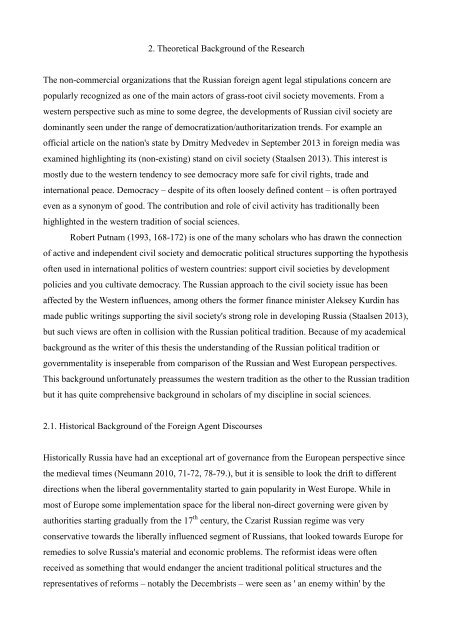Foreign Agents in Russia - Doria
Foreign Agents in Russia - Doria
Foreign Agents in Russia - Doria
Create successful ePaper yourself
Turn your PDF publications into a flip-book with our unique Google optimized e-Paper software.
2. Theoretical Background of the Research<br />
22<br />
The non-commercial organizations that the <strong>Russia</strong>n foreign agent legal stipulations concern are<br />
popularly recognized as one of the ma<strong>in</strong> actors of grass-root civil society movements. From a<br />
western perspective such as m<strong>in</strong>e to some degree, the developments of <strong>Russia</strong>n civil society are<br />
dom<strong>in</strong>antly seen under the range of democratization/authoritarization trends. For example an<br />
official article on the nation's state by Dmitry Medvedev <strong>in</strong> September 2013 <strong>in</strong> foreign media was<br />
exam<strong>in</strong>ed highlight<strong>in</strong>g its (non-exist<strong>in</strong>g) stand on civil society (Staalsen 2013). This <strong>in</strong>terest is<br />
mostly due to the western tendency to see democracy more safe for civil rights, trade and<br />
<strong>in</strong>ternational peace. Democracy – despite of its often loosely def<strong>in</strong>ed content – is often portrayed<br />
even as a synonym of good. The contribution and role of civil activity has traditionally been<br />
highlighted <strong>in</strong> the western tradition of social sciences.<br />
Robert Putnam (1993, 168-172) is one of the many scholars who has drawn the connection<br />
of active and <strong>in</strong>dependent civil society and democratic political structures support<strong>in</strong>g the hypothesis<br />
often used <strong>in</strong> <strong>in</strong>ternational politics of western countries: support civil societies by development<br />
policies and you cultivate democracy. The <strong>Russia</strong>n approach to the civil society issue has been<br />
affected by the Western <strong>in</strong>fluences, among others the former f<strong>in</strong>ance m<strong>in</strong>ister Aleksey Kurd<strong>in</strong> has<br />
made public writ<strong>in</strong>gs support<strong>in</strong>g the sivil society's strong role <strong>in</strong> develop<strong>in</strong>g <strong>Russia</strong> (Staalsen 2013),<br />
but such views are often <strong>in</strong> collision with the <strong>Russia</strong>n political tradition. Because of my academical<br />
background as the writer of this thesis the understand<strong>in</strong>g of the <strong>Russia</strong>n political tradition or<br />
governmentality is <strong>in</strong>seperable from comparison of the <strong>Russia</strong>n and West European perspectives.<br />
This background unfortunately preassumes the western tradition as the other to the <strong>Russia</strong>n tradition<br />
but it has quite comprehensive background <strong>in</strong> scholars of my discipl<strong>in</strong>e <strong>in</strong> social sciences.<br />
2.1. Historical Background of the <strong>Foreign</strong> Agent Discourses<br />
Historically <strong>Russia</strong> have had an exceptional art of governance from the European perspective s<strong>in</strong>ce<br />
the medieval times (Neumann 2010, 71-72, 78-79.), but it is sensible to look the drift to different<br />
directions when the liberal governmentality started to ga<strong>in</strong> popularity <strong>in</strong> West Europe. While <strong>in</strong><br />
most of Europe some implementation space for the liberal non-direct govern<strong>in</strong>g were given by<br />
authorities start<strong>in</strong>g gradually from the 17 th century, the Czarist <strong>Russia</strong>n regime was very<br />
conservative towards the liberally <strong>in</strong>fluenced segment of <strong>Russia</strong>ns, that looked towards Europe for<br />
remedies to solve <strong>Russia</strong>'s material and economic problems. The reformist ideas were often<br />
received as someth<strong>in</strong>g that would endanger the ancient traditional political structures and the<br />
representatives of reforms – notably the Decembrists – were seen as ' an enemy with<strong>in</strong>' by the
















